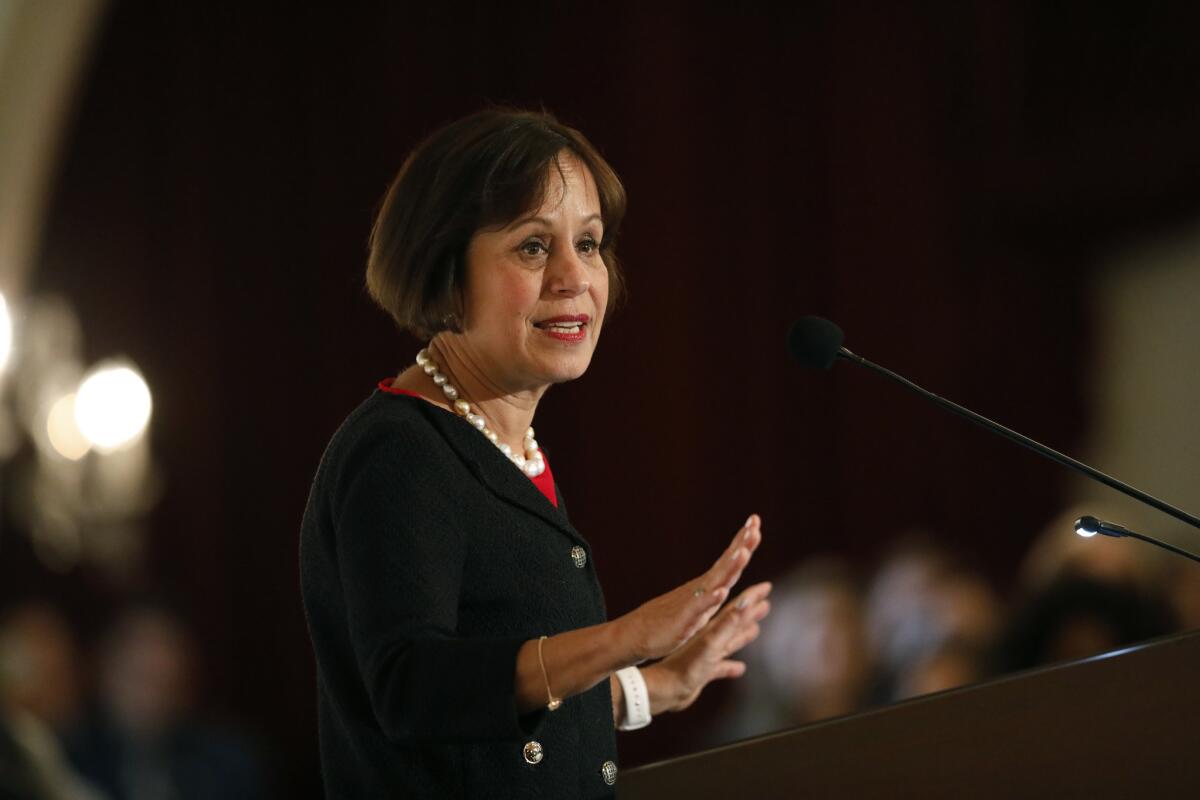USC president gets new Santa Monica home and trims her salary amid pandemic

USC has purchased an $8.6-million home in Santa Monica for its president, a transaction that closed just before the onset of a global pandemic that has resulted in austerity cuts announced Friday at the private university.
Carol Folt, who took over as president last summer, bucked the four-decade trend of USC leaders residing at a sprawling compound in San Marino that was bequeathed to the university by Seeley Mudd, a former medical school dean.
Instead, Folt opted to live in a modern, eco-friendly home near the Pacific Palisades that offers views of the ocean and the Santa Monica Mountains. After renting it for about $35,000 a month, USC opted to buy it, and after the trustees signed off, the sale closed March 2. The deal was first reported this week by Variety.
Despite the price tag, Rick Caruso, the billionaire chairman of USC’s board of trustees, argued that the move was prudent, citing the costly overhead at the Mudd estate, along with a host of plumbing, electrical and seismic upgrades.
“The home in San Marino, albeit this stately beautiful home, is a very expensive home to maintain,” Caruso said. “We made the decision, where the board felt we should sell the original home and size down.”
Caruso said the university should be held accountable, “and it is for that reason that we decided not to spend $20 million to update the Mudd estate, and sell it.”
Folt, a biologist by training, has sought to focus on sustainability, and in a statement, USC noted the Santa Monica property’s efficient features. Designed by the late Ray Kappe, a titan of California Modernism, the new home has sustainable landscaping and “an overall footprint that is more than 40 times smaller” than the San Marino estate, which had gardens, a tennis court and 14,000 square feet of living space, the statement said.
There are symbolic reasons for giving up the Mudd estate, which in some ways epitomized Folt’s predecessors and old-money Southern California. President Emeritus C.L. Max Nikias and his wife, Niki, routinely hosted events there, greeting professors over intimate dinners and drinks, or feting hundreds of well-heeled donors under a massive backyard tent. A USC publication once touted their daunting entertainment schedule, with more than 15,000 guests in four years.
“And we shake hands with every one of them as they come through the door,” Nikias said at the time.
The late Steven B. Sample and his wife also resided there. Caruso acknowledged having fond memories of the place.
“The times have changed how university presidents operate,” Caruso said. “We also have a very contemporary president who lives a very different lifestyle, and I felt, the board felt, that the home has to be such that it is a place where Carol is happy.”
Caruso estimated that the San Marino property, which at eight acres is one of the largest estates in the tony city, would have fetched more than $20 million. But plans for its sale have been delayed by the abrupt collapse brought on by the COVID-19 pandemic.
“Now is not the time to put it on the market,” Caruso said.
The purchase of the new manse comes amid tremendous upheaval at USC and other universities across the nation. As the deadly threat of the novel coronavirus became apparent, the private university sent students home, shifted classes online, canceled sports seasons and campus events and moved its commencement ceremonies onto a virtual platform.
On Friday, USC leaders announced cuts, including a hiring freeze, a pause on capital construction and a 20% reduction to Folt’s salary.
“We need to make some tough calls right now to address the serious financial consequences we face,” said a joint letter from Chief Financial Officer Jim Staten and Provost Charles Zukoski. “This is a monumental health crisis.”
Senior executives and deans are also taking 10% pay cuts, and all the savings will be donated to provide financial aid and emergency assistance for students and staff.
Staten and Zukoski identified several sources of financial pressure: “sizable” costs associated with responding to the coronavirus outbreak, overall revenue declines, a drop in the endowment, “slowdowns in philanthropy,” increased demand for financial aid and “legacy legal issues,” such as the $215-million class-action settlement to resolve some sexual misconduct allegations against former campus gynecologist Dr. George Tyndall. USC is expected to start paying alumnae this month.
Zukoski, who was hired last year, had previewed some financial challenges in a November 2019 speech delivered at his formal installation, long before a disruptive pandemic had taken hold.
“Our operational costs are increasing faster than our revenues,” Zukoski said at the time. “This is not ideal, and we will have to adjust.”
More to Read
Sign up for Essential California
The most important California stories and recommendations in your inbox every morning.
You may occasionally receive promotional content from the Los Angeles Times.











